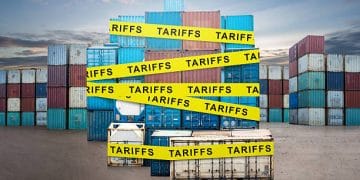Supply Chain Report – 10/10/2025
US business leaders are voicing growing concern over the potential impact of President Trump’s proposed tariff policies, warning that they could disrupt supply chains, raise costs, and ultimately lead to higher prices for American consumers.
According to KPMG’s latest US CEO Outlook survey, which gathered insights from 400 chief executives at companies with annual revenues of at least $500 million, 86% of CEOs expect to raise prices in response to new tariff-related costs. Tim Walsh, CEO of KPMG US, told Yahoo Finance’s Opening Bid that many companies are already adjusting their pricing and operational strategies to mitigate the financial strain. “CEOs are needing to react as it relates to their tariffs and their supply chains. They’re doing cost takeout to react to that additional cost,” Walsh said.
The survey results come shortly after President Trump announced a 25% tariff on all imported medium- and heavy-duty trucks, effective November 1. The measure, shared on Truth Social, is part of a broader strategy aimed at boosting domestic manufacturing. Mexico, the largest supplier of these vehicles to the US, is expected to be among the countries most affected.
KPMG’s report also found that 89% of CEOs anticipate tariffs will significantly affect their business performance over the next three years. In response, 85% are revising sourcing and production strategies, with many companies shifting operations or materials closer to home to minimize exposure to international trade disruptions. These changes are being seen across multiple industries — including manufacturing, technology, automotive, and retail — as firms seek greater supply chain stability.
The evolving tariff landscape follows Trump’s “Liberation Day” trade policy overhaul earlier this year. A 10% baseline duty now applies to most imports, with higher “reciprocal” rates targeting countries with trade surpluses against the US. China faces tariffs exceeding 30%, while Brazil and India are subject to 50% duties on select products. The European Union, after negotiations, settled on a 15% tariff agreement in August 2025. In addition, the “de minimis” exemption for imports under $800 was eliminated, bringing even small online orders under new duty requirements.
Industry leaders remain divided over the broader economic effects. Ford CEO Jim Farley said the new tariffs have created a $2 billion financial headwind, limiting further US investment. Meanwhile, Union Pacific CEO Jim Vena supported the policy shift, calling it “great for the economy” and beneficial to domestic production.
Despite these challenges, CEO sentiment remains relatively strong. KPMG reported that 84% of business leaders remain confident about their company’s growth outlook, while 74% are optimistic about the global economy. Top challenges cited by executives include supply chain resilience (34%), cybersecurity (29%), and economic uncertainty (25%).
Investment in artificial intelligence (AI) also remains a key strategic focus, with roughly three-quarters of CEOs prioritizing AI development to enhance efficiency and competitiveness. “CEOs are starting to see that AI come through—they’re seeing the agents, and understanding the impact it can have on how they deliver in the market,” Walsh added.
As US trade and manufacturing policies continue to evolve, businesses are preparing for both short-term disruptions and long-term adjustments, balancing cost pressures with opportunities to innovate and localize operations.
#TradePolicy #EconomicUpdate #SupplyChainNews #BusinessOutlook #USImports















